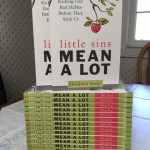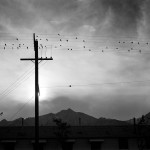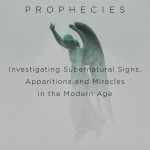I just finished (and loved) The Last Secret of Fatima by Cardinal Tarcisio Bertone, which will be coming out in early May but may be pre-ordered.
If you followed coverage of Pope Benedict’s XVI’s recent visit to America, you saw a lot of Cardinal Bertone, the Vatican’s SecState; you’ll recall he told informed the pope, in St. Patrick’s Cathedral, of the moment of the anniversary of his election, at which the pope spoke so eloquently and extemporaneously.
The Last Secret of Fatima is actually a book-length interview (along the lines of God and the World) between Cardinal Bertone and Giuseppe De Carli, the head of Vatican broadcasting – one initiated by De Carli, and addressing the endless speculation about the “last secret” given to Lucia de Santos by the Virgin Mary nearly a century ago in Portugal. The Vatican, under John Paul II’s orders, made that “secret” public in 2000, but for some the revelation has never satisfied. I ate the book up and even found the forward (by Pope Benedict) and the introduction to be interesting and compelling.
Because it is in interview form, The Last Secret of Fatima is a fast and entertaining read – at times its two participants interrupt each other, get testy or teasing, and once they abruptly fall into a quick discussion about an Italian soccer team, but all the while they are giving us some tantalizing glimpses into the thinking and personalities of John Paul I, John Paul II, Joseph Ratzinger (both as Cardinal and as Pope Benedict) and Sr. Lucia, herself. It also goes into surprising medical and political detail about the assassination attempt against John Paul, and how that event, coupled with his finally asking to see Lucia’s letter, shaped the remainder of his papacy. If we always knew that John Paul was a first-class mystic, we meet his stubbornness, and Lucia’s liveliness. Also very interesting, particularly in light of his recent visit, we get to see Ratzinger the careful theologian and scholar as obedient servant.
A few excerpts:
Bertrone: As Cardinal Ratzinger correctly explained, a prophecy, even a catastrophic or apocalyptic one, cannot be inevitable. Our Lady called for “Penance, Penance, Penance!” Prayer and penance are stronger than evil and bullets. Prophecy does not predict some inevitable fate that is deterministically bound to happen no matter what. Otherwise, we would be at the mercy of dark forces dangling us over an abyss of nothingness. That would make absolutely no sense given everything that we know about theology, spirituality, or the Church…On the contrary, prophecy is an urgent invitation to conversion, penance and prayer, and the point is that these things have the power to change the course of history. The mistake made by some of the Fatamists after the publication of the Third Secret was to give the text a literal, fatalistic interpretation. They hastily concluded that the Vatican had withheld the Third Secret until the year 2000 because John Paul II had survived the assassination attempt, whereas, in their view, the pope’s actual death was a requirement for the prophecy to be fulfilled. They seemed to assume that everything is governed by chance, and not by the God who “delivers us from evil.” The freedom to do evil is not the last world. True freedom is the freedom to be on God’s side.
[…]
Q: For the first time ever, the custodian of the Catholic faith Cardinal Joseph Ratzinger, was making public statements about a private revelation. This alone would have been enough to underscore the exceptional nature of the event. After all…the same Ratzinger had said, “Fatima will not be the origin of the apocalypse. That is impossible. No apparition is indispensable to the faith, because Revelation ended with Jesus Christ. Secret messages add nothing to what a Christian needs to know of Revelation.” Your Eminence, I have the distinct impression that if Ratzinger had had his druthers, the Secret would have stayed a secret. Or am I mistaken?Bertrone: I think you are. Pope Benedict XIV had already given the Church a carefully worked out distinction between public and private revelation. So it wasn’t as if we were jumping over a cliff with no safety net. Moreover, Cardinal Ratzinger was not opposed to revealing the Third Secret. He didn’t have any doubts or objections. The assassination attempt and the pope’s illness were signs. The last postscript to the shooting was the pope’s offering of forgiveness to Ali Agca at the Rebibbia prison on December 27, 1983. We were almost overwhelmed by the abundance of very meaningful signs. So why not transmit the call of Fatima to the broader Christian community? After all, it is the call to conversion, prayer and penance issued by Our Lord’s Mother, herself. The Fatima message is saturated with the Gospel. [emphasis mine – admin]
The book is very nearly up to the moment, discussing Pope Benedict’s Regensberg address and how quickly his remarks were jumped on and misreported by the press both in Europe and in America, the pope’s visit to Turkey, and what Fatima means to Islam. I knew that Fatima was named for Mohammed’s favorite daughter, who married a Christian and made her stand on that bit of land in Portugal, but I was not aware, for example, of this:
Q: …Fatima plays a role for Shiite that is similar to the role of Mary in Catholicism. For instance, Shiite theology assigns Fatima a part in the end-times. The Shiites believe that the Fatima shrine belongs by right to the Muslims and that the Catholics have stolen it form its rightful owners. They argue that if a Lady dressed in shining white appeared there, then it’s because she had a message for Muslims and not for Christians…[the question continues and goes into behavior De Carli has witnessed by Muslins at the Fatima Shrine]
Bertone: Let’s stick with the prophecy and not stray into other areas…when I met with Lucia the second time she showed absolutely no interest in drawing connections between Fatima and the attack on the Twin Towers…
The conversation between Bertone and Di Carli is lively and far-reaching, at one point one of them even quotes Magdi Allam who we know since Easter as Magdi Christiano Allam.
I will admit that Fatima has never held much fascination for me as it has for others. These apparitions are not articles of faith and while the Church very carefully investigates them and either recommends them as “worthy of belief” or not, (as it says in the book, between 1928 and 1975 there were 232 reported apparitions in thirty-two countries; the Church has recognized only 15 as authentic) Catholics are under no compulsion to pay heed to any of them. Even so, I found eavesdropping-with-permission on Cardinal Bertrone and Giuseppe De Carli to be irresistable, fascinating and ultimately very satisfying both to the spirit and to the intellect. It’s a good ‘un!
Curt Jester has his review here.










